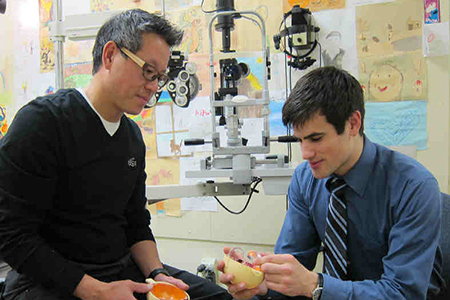If you possess the following characteristics you may be an engineer at heart: curiosity–—why things work and how they can work better; perseverance—good analytical skills combined with strong desire and effort will result in success; and willingness to work in a team—it takes more than one person to break down some of the complexities of engineering.
An engineering education is so versatile! Your degree can open up a world of options—and a wide range of jobs. One of the greatest assets of studying engineering is not necessarily that it transforms you into an “engineer.” Rather it’s learning a way to think innovate and explore using a particular skill set. These skills can be applied easily to almost all fields because so many industries need engineers.
CURRENT TRENDS IN ENGINEERING
This year engineering is particularly focused on environmental and health-related advances. Mark Wicks, associate vice president for academic affairs at Kettering University describes the trend: “The U.S. will see an increase in jobs in environmental engineering due to government regulations an emphasis on preventing environmental problems and an emphasis on public health. As we decrease our dependence on fossil fuels another expected job growth area will be renewable and alternative energy.” In response to this need Kettering has added a specialty in alternative energy for mechanical engineering students to study renewable resources like sun wind and water.
If you can imagine being part of a team that could truly change the world you should explore engineering!
SURVEY YOUR OPTIONS IN HIGH SCHOOL
Did you know you can (and should) start preparing for your engineering career while still in high school? There are many courses both within and outside of your core classes that can help you achieve your goals.
E. Manos Maragakis, dean of the College of Engineering at the University of Nevada Reno advises, “Students should follow a math and science curriculum. Students on a pre-calculus/calculus track are better prepared when they enter college. Physics and chemistry courses also help a student prepare for a career in engineering. The math and science courses not only provide background needed for the engineering curriculum but also train the student to think analytically synthesize information and produce practical solutions.”
In addition to math and science you’ll need to have good analytical skills and be able to communicate. Engineers often have to convince peers of their conclusions so you’ll need to know how to write and speak effectively. Be sure to take courses that help you learn how to do these things.
Also be sure to check out college websites. They usually highlight cool projects that current students are working on. For example the Milwaukee School of Engineering’s (MSOE) site (www.msoe.edu) tells the story of a group of students building a car that gets well over 1000 miles to the gallon! At MSOE this is just one of the many projects involving energy conservation. Tim Valley, vice president of enrollment management explains,”A lot of our engineering students are interested in developing new sustainable technologies in everything from mechanical and electrical applications to building and health-related fields. It is about changing the world and making a difference in people’s lives every day.”
TALK TO ENGINEERS
There are other steps you should consider taking while you are still in high school like networking with like-minded students and connecting with an engineering professional. This person can serve as a mentor providing advice and showing you what an engineering career is really like. Trying out internships or jobs that introduce you to engineering will make it easier to decide if it’s the right field for you.
Your school is full of resources from the career center to your guidance counselor. Hit the Web to see what projects engineers are currently tackling. Check out professional engineering associations’ and societies’ websites to find student chapters. College and university career centers also have great resources and many offer career days for high school students. Investigate college and university sites to see not only what programs they offer but also what they require of applicants.
Like other colleges engineering schools will look for a variety of experiences on your application such as AP courses employment volunteer work and even dual enrollment (taking college credits while in high school optimally in engineering). Many universities offer pre-college engineering programs in the summer so you can get an early taste of what’s to come. Remember the more experience you have the better prepared you will be for your undergraduate studies!
LAY A FOUNDATION IN COLLEGE
Most college and universities offer accredited engineering programs that will provide you with the fundamentals but you’ll need to fill in the gaps when it comes to specialization. Like other majors engineering students will spend the first two years of college fulfilling their core general studies and investigating different types of engineering deciding on a specific major by the end of their second year. So you’ve got some time to mull over all your options.
Doug Goering, dean of the College of Engineering and Mines at the University of Alaska Fairbanks explains what the curriculum looks like: “When students begin their studies . . . they typically take calculus physics chemistry and our intro to engineering course along with some additional core courses like English. Once students decide which engineering major they would like to follow their courses will be small lab- and discussion-based courses.”
Most engineering programs are divided into thirds; two-thirds are devoted to the major course and one-third is devoted to math and general science courses. The major courses are the core of what graduates will need to know on the job——the analytical skills that will help them problem solve. As students move through the curriculum projects will be more independent (often in small groups from concept to fabrication and testing) and require more learned skills.
Engineering schools offer unique ways to get your learning groove on like 3/2 programs or co-op programs. A 3/2 program or formal double-degree undergraduate program is run by two separate colleges. It allows students to study for three years at one school and two years at another. They earn two bachelor’s degrees one from each school and generally of different types (B.A. and B.S.).
Many schools offer co-op programs which allow students time in the industry. Thesis projects are required but these are also generally company projects so students not only graduate with job experience but they also know how their skills will apply to the real world. Others such as the University of Nevada Reno offer accelerated B.S./M.S. programs that allow high-achieving students to reduce degree completion time.
One of the best things about engineering school is that there are no limits to what you can learn. Larry Jacobs, associate dean for academic affairs at Georgia Tech’s College of Engineering and professor of mechanical engineering says, “One trend we have been focused on at Georgia Tech is giving students a full picture of how engineering can impact the world. I tell students to think about engineering as a career where they can make a world of difference. Engineering is essential to all of our health happiness and safety. Engineering in the U.S. and the world is growing and the world needs creative problem solvers which is exactly who engineers are.”
At Georgia Tech students are encouraged to invent. One mechanical engineering student recently won a contest for his “Omega Wear” strengthening apparel engineered to increase calorie burn and improve muscle endurance!
BUILD YOUR IDEAL CAREER
An engineering education boosts innovation preparing students for many fields like healthcare banking and finance regulation and environmental sustainability—for which an engineering background makes a solid foundation.
Because the U.S. and other economies have been in recession “there has been a shift in priorities that the industry sets. As companies are becoming tighter with their budgets more money is going into project planning,” says Goering. “There is still a high demand for engineers. The best engineers are those who can quickly identify a problem and find the most practical and cost-effective measures to solve it.”
Maragakis agrees: “An engineering degree is still one of the most desirable degrees in terms of employment potential.”
In addition to a wide variety of job possibilities engineers have high starting salaries regardless of field. (See the chart on page 60 for the average starting salaries for engineers by degree.)
Engineers are clearly valued throughout the U.S. and the world even in a recession because their skills are adaptable and diverse. The U.S. also needs more engineers for global competition and to replace the outgoing retirees. “Our students have unlimited potential as to where they work,” says Maragakis.
“It’s one of the coolest jobs——with all its problem-solving modern emphasis on sustainability the environment infrastructure renewable energy and information and communications technology——that a young person could ever have,” continues Maragakis.
A cool job high starting salary interesting and challenging problem-solving work and in demand by almost every industry. What more can you ask for from a major?
| Average Starting Salaries for Engineers by Degree | |||
| ENGINEERING MAJOR | BACHELOR’S AVE. OFFER |
MASTER’S AVE. OFFER |
DOCTORATE AVE. OFFER |
| Aerospace / Aeronautics | $55,943 | $68,061 | $90,505 |
| Bio & Biomedical | $53,417 | $72,071 | n/a |
| Chemical | $66,675 | $70,484 | $85,250 |
| Civil | $52,287 | $53,311 | $60,351 |
| Computer | $60,844 | $72,771 | $104,286 |
| Electrical | $60,509 | $70,921 | $89,715 |
| Environmental | n/a | n/a | n/a |
| Materials | $58,076 | n/a | n/a |
| Mechanical | $59,222 | $66,961 | $75,186 |
| Nuclear | $60,209 | n/a | n/a |
| Source: National Association of Colleges and Employers, Fall 2009 Salary Survey | |||
Sarah S. Cox is a writer and editor in Northern Virginia.



